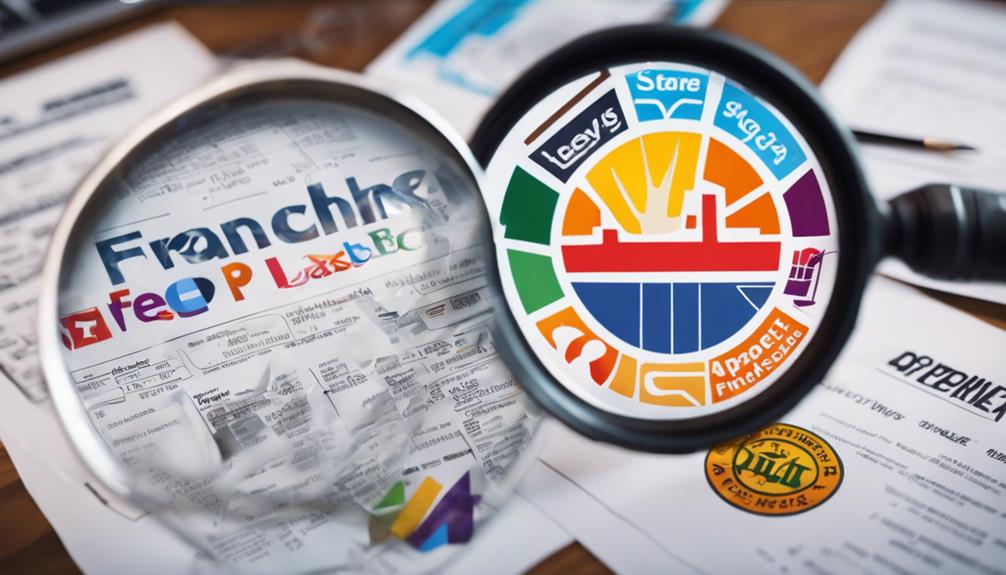Discovering affordable franchise opportunities opens doors to entrepreneurship with reduced risks. Many franchises require initial investments under $50,000, providing viable options for those seeking financial independence. Franchise opportunities often come with established systems and training, guiding new owners through the early stages of business. Ongoing support from franchisors enhances operational success while brand recognition helps draw customers. It’s crucial to evaluate financial obligations, including royalty and marketing fees. For individuals looking to explore this route, understanding the unique advantages and growth potential of various franchise models can lead to informed decisions and brighter futures. More insights await those ready to explore further.
Key Elements

Understanding the key elements of a franchise is vital for potential investors.
This includes a thorough company overview, insights into the business model, and essential information for franchisees.
Company Overview
A thorough company overview includes key elements such as franchise history, mission statement, and operational structure.
Understanding the franchise's background helps potential investors gauge its stability and growth trajectory. The mission statement reflects the company's core values and objectives, guiding its overall direction and decision-making.
Additionally, the operational structure details the organization's hierarchy and the roles of key personnel, providing insights into how the franchise functions daily. This information is crucial for prospective franchisees, as it allows them to assess the company's support systems and culture.
Business Overview
Exploring the business overview involves examining key elements such as the franchise's unique value proposition, target market, and competitive advantages that contribute to its success.
A franchise's value proposition sets it apart, highlighting what makes it appealing to customers and investors alike.
Identifying the target market is vital, as it informs marketing strategies and operational decisions.
Competitive advantages, like brand recognition, proven systems, and strong supplier relationships, can greatly impact a franchise's performance.
Additionally, understanding the franchise's operational model, revenue streams, and growth potential is essential for prospective franchisees.
These elements combine to create a thorough picture of the franchise's viability, helping individuals make informed decisions about their investment in affordable franchise opportunities.
Information for Franchisees
Franchisees need to grasp essential elements, such as initial investment costs, ongoing fees, and support provided by the franchisor, to make informed decisions. Understanding these key factors helps franchisees evaluate potential opportunities accurately.
Initial investment costs can vary widely, often outlined in the franchise disclosure document (FDD), which also details ongoing royalties and marketing fees. Additionally, analyzing the support system is vital; franchisors typically offer training, marketing assistance, and operational guidance.
Franchisees should also conduct thorough research, engaging with current and former franchisees to gain insights into their experiences. By considering these critical elements, individuals can align their choices with their financial goals and personal aspirations, ultimately leading to a successful franchise journey.
Company Overview

When exploring affordable franchises, understanding the company's background is essential.
Each franchise has its own inception story, milestones, and core purpose that shape its goals and competitive landscape.
Analyzing the executive team's experience also provides insight into the franchise's potential for success.
Franchise Inception and Milestones
Franchises often begin with a clear vision and strategic milestones that define their growth trajectory and operational success. Each franchise typically starts with foundational goals, such as establishing brand recognition and expanding its market presence.
Early milestones often include securing initial funding, developing training programs, and opening the first few locations. As the franchise grows, it continuously assesses performance metrics, enabling it to adapt and refine its strategies.
These milestones not only mark achievements but also guide future expansions and franchisee support systems. By focusing on these critical stages, franchises can effectively cultivate a sustainable business model that attracts potential franchisees and fosters long-term relationships within the community.
Core Purpose and Goals
The core purpose of a franchise is to deliver a proven business model that empowers individuals to achieve financial independence while fostering brand growth and community engagement.
Franchises focus on creating a symbiotic relationship between the brand and its franchisees, enabling them to leverage established systems, training, and support. These structures help franchisees navigate their entrepreneurial journey, reducing risks associated with starting a business from scratch.
Additionally, franchises aim to cultivate strong community ties, often encouraging local involvement and social responsibility.
By aligning their goals with those of their franchisees, companies endeavor for mutual success, ensuring that both parties benefit from increased market presence and customer loyalty.
This collaborative approach sets the foundation for sustainable growth and prosperity.
Executive Team Backgrounds
An effective executive team, with diverse backgrounds and expertise, plays an essential role in guiding the franchise's strategic vision and operational success.
The leadership often includes individuals with experience in various industries, bringing unique insights into market trends and consumer behavior. Their combined knowledge helps shape innovative strategies that drive growth and profitability.
Many executives have backgrounds in finance, marketing, and operations, ensuring a well-rounded approach to decision-making. This diversity also fosters a culture of creativity and problem-solving, essential for adapting to an ever-changing business landscape.
With their collective experience, the executive team positions the franchise to capitalize on opportunities while effectively maneuvering challenges, ultimately supporting franchisees in achieving their goals.
Competitive Landscape Overview
Understanding the competitive landscape helps franchisees identify opportunities and challenges within their chosen market. Analyzing existing franchises reveals key players, their market share, and growth potential.
Franchisees should assess competitor strengths and weaknesses, considering factors like brand recognition, customer loyalty, and service offerings. This insight enables them to position their franchise effectively, tapping into unmet needs or underserved demographics.
Additionally, recognizing trends within the industry—such as technology integration or sustainability practices—can provide additional advantages. Competitive analysis also highlights pricing strategies and promotional tactics, guiding franchisees in crafting their approach.
Ultimately, a thorough understanding of the competitive landscape equips franchisees with the knowledge needed to navigate their market successfully and make informed investment decisions.
Brand Identity

Brand identity plays an essential role in the success of affordable franchises, as it fosters consumer awareness and loyalty.
Franchises that emphasize ethical business practices not only attract customers but also build a solid reputation in the market.
Consumer Awareness and Loyalty
Consumer awareness plays an essential role in building loyalty and establishing a strong brand identity within the franchise market. When consumers recognize a brand, they're more likely to choose it over competitors, enhancing customer loyalty.
Franchises that effectively communicate their values and unique selling propositions foster trust among their audience. This trust translates into repeat business, as satisfied customers spread positive word-of-mouth.
Furthermore, consistent branding across all platforms—whether online or in-store—reinforces brand recognition, making it easier for consumers to identify and engage with the franchise.
Ethical Business Practices Emphasized
Franchises that prioritize ethical business practices build a strong brand identity and foster trust among their customers.
By committing to transparency, fairness, and responsibility, these businesses distinguish themselves in the competitive franchise landscape. They actively engage in sustainable practices, support local communities, and guarantee fair treatment of employees and suppliers.
This dedication to ethics not only enhances their reputation but also attracts like-minded franchisees and customers who value integrity.
In addition, ethical franchises encourage open communication and feedback, creating a culture of accountability and continuous improvement.
As a result, these brands not only achieve customer loyalty but also pave the way for long-term success in the marketplace, proving that ethical practices are essential for a thriving business.
Proven Profitability and Growth Potential
Proven profitability and growth potential are essential factors that attract investors to successful franchise models.
Franchises with a strong brand identity often demonstrate consistent revenue generation and market expansion.
Investors look for established franchises that have a track record of financial success, as this indicates a lower risk of failure.
Popular franchises frequently provide extensive support, marketing strategies, and operational guidelines, enhancing their growth prospects.
Furthermore, these successful brands often benefit from customer loyalty, allowing them to maintain a competitive edge.
Information for Franchisees

When considering a franchise opportunity, potential franchisees should thoroughly understand the costs, support systems, and overall fit with their personal and financial goals.
They need to review the Franchise Disclosure Document (FDD), which outlines vital information about the franchise, including operational guidelines and support offered.
Engaging with current and former franchisees provides valuable insights into day-to-day operations and the franchise's culture.
Consulting legal and financial professionals can also clarify complex information and guarantee informed decisions.
Additionally, evaluating personal strengths and skills helps franchisees choose a model that aligns with their expertise.
Researching the franchise's market presence and reputation is essential for long-term success and satisfaction in their chosen venture.
Financial Requirements & Ongoing Fees

When considering an affordable franchise, understanding the financial requirements and ongoing fees is essential.
Franchisees need to evaluate the initial investment costs, including startup capital and any additional fees tied to revenue, marketing, and supplies.
Startup Capital Requirements
Understanding startup capital requirements is essential for potential franchisees, as it encompasses both initial investment and ongoing fees that can greatly impact financial planning.
Franchisees need to be aware of the financial obligations beyond the initial purchase price, which may include royalty fees, marketing contributions, and other operational costs. These ongoing fees can vary considerably depending on the franchise brand and business model.
Additionally, potential franchisees should consider their working capital needs to guarantee they can cover expenses during the initial phase of operation.
By thoroughly evaluating these capital requirements, aspiring franchise owners can make informed decisions, confirming their investment aligns with their financial capabilities and long-term goals.
Proper planning can lead to a more successful franchise experience.
Initial Franchise Investment Cost
Evaluating the initial franchise investment cost is essential for potential franchisees, as it encompasses both upfront expenses and ongoing fees that directly impact profitability.
These costs typically include franchise fees, equipment purchases, real estate, and initial inventory. Additionally, potential franchisees should consider ongoing fees such as royalties and marketing contributions, which can greatly affect cash flow.
The investment range varies widely, with some franchises requiring less than $50,000 while others may demand upwards of $150,000. Franchise disclosure documents (FDD) provide a detailed breakdown of these costs, helping prospective owners understand their financial commitments.
Ongoing Percentage of Revenue
Franchisees typically face ongoing fees that include a percentage of their revenue, which can greatly impact their overall profitability. These fees are often structured as a royalty payment, typically ranging from 4% to 8% of gross sales.
While this model helps maintain brand standards and provides franchisees with ongoing support, it's vital for potential franchisees to factor these costs into their financial projections. Understanding the specific percentage required by each franchise can aid in evaluating long-term viability.
Additionally, some franchises may impose other fees related to technology or operational support. By carefully reviewing these ongoing costs, franchisees can guarantee they maintain a healthy profit margin while benefiting from the franchise system.
Marketing Contribution Percentages
Marketing contributions typically require franchisees to allocate a percentage of their revenue, which can range from 1% to 4%, to support brand-wide advertising efforts and promotional initiatives. This fee is vital for maintaining brand presence and attracting customers across all franchise locations.
Franchisees benefit from collective marketing strategies that amplify reach and effectiveness, ensuring their business stays competitive. These contributions often cover various advertising channels, including digital, print, and social media campaigns, which can markedly enhance local visibility.
While the percentage may seem modest, franchisees should carefully assess their budget to accommodate this ongoing expense. Understanding these marketing contributions is essential for long-term financial planning and ensuring the success of their franchise venture.
Royalty and Supply Fees
Royalty fees are a critical component of franchise financial requirements, typically ranging from 4% to 8% of gross sales. These fees support the ongoing operations and brand development of the franchise.
In addition to royalty fees, franchisees often face supply fees, which cover costs for products, services, or materials sourced from the franchisor. These fees can vary widely based on the franchise's industry and the terms set forth in the franchise agreement.
Franchisees should carefully evaluate these ongoing fees, as they can considerably impact overall profitability. Understanding these financial obligations is essential for potential franchisees to guarantee they're making informed decisions that align with their financial goals and capabilities.
Financing Options

When considering affordable franchises, understanding financing options is essential.
Many franchises offer in-house funding solutions, while alternative funding sources can provide additional support.
Additionally, Small Business Administration lenders often play an important role in helping potential franchisees secure the necessary capital.
In-House Funding Options Available
Many franchises offer in-house funding options, making it easier for aspiring franchisees to secure the necessary capital for their investment.
These programs can include loans, payment plans, or leasing arrangements, often tailored to meet individual financial situations.
By providing direct financing, franchise brands help reduce the barriers to entry for potential owners.
This funding can cover initial fees, equipment, and other startup costs, streamlining the process for franchisees.
Additionally, in-house financing may come with competitive interest rates and flexible terms, enabling franchisees to focus on their business growth rather than worrying about external financing complexities.
Alternative Funding Sources Available
In addition to in-house funding options, aspiring franchisees can explore alternative funding sources to secure capital for their investment.
These alternatives often include personal loans, which allow individuals to leverage their creditworthiness.
Additionally, crowdfunding platforms enable franchisees to gather small contributions from a larger audience, creating a community of backers invested in their success.
Peer-to-peer lending can also provide access to funds without traditional banking constraints.
Moreover, some franchise brands offer financial assistance or partnerships with third-party lenders, making it easier for franchisees to obtain necessary capital.
Exploring these diverse financing options can help aspiring franchisees find the right fit for their budget and business goals, ultimately paving the way for successful franchise ownership.
Small Business Administration Lenders
Aspiring franchisees often turn to Small Business Administration (SBA) lenders for accessible financing options tailored to their needs. SBA loans typically offer lower down payments and longer repayment terms, making them attractive for those entering the franchise world.
These loans can cover startup costs, equipment purchases, and working capital. Franchisees can apply for various SBA loan programs, including the 7(a) loan and the CDC/504 loan, each designed to meet unique financing requirements.
Training & Support Offered

When considering affordable franchises, the training and support offered can make a significant difference in success.
Many franchises provide extensive onboarding workshops and continuous skill enhancement sessions to guarantee franchisees are well-prepared.
Additionally, training manuals and guides serve as valuable resources for ongoing development.
Comprehensive Onboarding Workshops
Thorough onboarding workshops provide invaluable training and support, ensuring franchisees are well-prepared to launch and operate their businesses effectively.
These workshops typically cover essential topics such as business operations, marketing strategies, and customer service best practices.
Franchisees engage in interactive sessions that facilitate hands-on learning, allowing them to ask questions and connect with experienced mentors.
Many franchises also incorporate role-playing exercises to simulate real-world scenarios, enhancing problem-solving skills.
Additionally, these workshops foster a sense of community among new franchisees, creating valuable networking opportunities.
With this robust training foundation, franchisees can confidently navigate the challenges of ownership and set their businesses up for long-term success.
Continuous Skill Enhancement Sessions
Continuous skill enhancement sessions equip franchisees with the latest industry knowledge and operational techniques essential for sustained success. These sessions provide ongoing training that keeps franchisees updated on market trends, technology advancements, and best practices. Regular workshops and webinars, often held by experienced professionals, guarantee that franchisees can adapt to changing customer demands and improve their service delivery.
Additionally, franchisees can engage in peer networking opportunities, sharing insights and strategies that foster collective growth. This collaborative environment encourages learning from others' successes and challenges.
With a commitment to continuous improvement, these enhancement sessions empower franchisees to refine their skills, boost operational efficiency, and ultimately drive profitability, guaranteeing they remain competitive in their respective markets.
Training Manuals and Guides
Franchisors provide detailed training manuals and guides to guarantee franchisees understand operational procedures and brand standards from the outset. These resources are vital for new franchisees, offering step-by-step instructions on everything from daily operations to marketing strategies.
By equipping franchisees with extensive knowledge, franchisors help maintain consistency across locations, which strengthens the brand's reputation. Moreover, many franchisors also offer ongoing training and support, addressing any questions or challenges that may arise.
This level of support not only boosts franchisee confidence but also enhances their chances of success. Overall, thorough training manuals and guides are a significant aspect of the franchise relationship, fostering a collaborative environment that benefits both parties.
LEGAL AND REGULATORY

When exploring affordable franchises, understanding the legal and regulatory aspects is essential.
Franchise disclosure documents (FDD) detail the cost breakdown, helping potential franchisees grasp their financial obligations.
Being aware of these legalities guarantees informed decision-making and smooth compliance throughout the franchise journey.
Franchise Cost Breakdown Details
When considering affordable franchises, understanding legal obligations and key sections of the franchise disclosure document (FDD) is essential.
Franchisees need to be aware of the costs outlined within the FDD to make informed decisions.
Key Sections to Review
A detailed breakdown of franchise costs is essential for potential franchisees to make informed investment decisions.
This includes understanding initial fees, ongoing royalties, and additional expenses like equipment and marketing.
Reviewing the franchise disclosure document (FDD) helps clarify these financial obligations, ensuring transparency.
Legal Obligations
Understanding the legal obligations tied to franchise costs is essential for potential franchisees, as it outlines the regulatory requirements and financial commitments they must meet.
Franchise Disclosure Documents (FDD) provide a detailed breakdown of initial investments, ongoing fees, and other obligations.
Franchisees should guarantee compliance with local laws and regulations, seeking legal advice to navigate complex legalities and protect their investments effectively.
MARKET ANALYSIS

The franchise sector continues to show impressive growth, attracting a diverse range of investors.
Understanding the ideal customer segments is essential for those exploring affordable franchise opportunities.
Franchise Sector Growth Statistics
The franchise sector has shown impressive growth rates, reflecting its increasing popularity among investors.
Recent trends indicate a shift towards more affordable franchise options, making it easier for individuals to enter the market.
Understanding these growth statistics can help potential franchisees identify promising opportunities aligned with their financial goals.
Franchise Sector Growth Rates
Reflecting a robust recovery and increasing consumer confidence, the franchise sector has demonstrated impressive growth rates in recent years.
According to recent statistics, franchises have expanded notably, with many sectors reporting double-digit growth.
This trend highlights the sector's resilience and adaptability, offering aspiring entrepreneurs promising opportunities.
As the economy continues to strengthen, franchise growth is expected to maintain its upward trajectory.
Franchise Sector Growth Trends
Franchise sector growth trends reveal a strong upward momentum, fueled by increased consumer spending and a rising demand for diverse services and products.
Recent statistics highlight a consistent expansion in franchise establishments, particularly in sectors like food, health, and fitness.
This growth signals a robust market environment, encouraging aspiring entrepreneurs to explore affordable franchise opportunities that align with current consumer interests and preferences.
Ideal Customer Segments
Understanding ideal customer segments is essential for franchise success.
By analyzing target demographic characteristics and consumer behavior insights, franchises can tailor their offerings to meet the unique needs of their audience.
This focus not only enhances customer satisfaction but also drives profitability in a competitive market.
Target Demographic Characteristics
Identifying the ideal customer segments for affordable franchises involves analyzing demographic characteristics such as age, income level, and entrepreneurial aspirations.
Typically, younger individuals or mid-career professionals seeking additional income are prime targets.
Those with a household income between $50,000 and $100,000 often find affordable franchises appealing, as they align with their financial capabilities and desire for business ownership without excessive risk.
Consumer Behavior Insights
Analyzing consumer behavior reveals that individuals seeking affordable franchises often prioritize financial stability and the potential for growth in their investment.
These customers typically look for established brands with proven success rates. They appreciate transparent cost structures and strong support systems.
Additionally, many prefer franchises that align with their personal interests and skills, ensuring a more fulfilling and manageable investment journey.
EXIT STRATEGY

When considering an affordable franchise, having a solid exit strategy is vital.
Many franchises offer buyback programs and clear transfer guidelines, which can ease the shift for owners looking to sell or step away.
Understanding these options helps franchisees plan their future while ensuring they maximize their investment.
Franchise Buyback Programs Available
Many franchises offer buyback programs, providing an exit strategy for franchisees looking to sell their business. These programs allow franchisees to sell their operations back to the franchisor, often at a predetermined price or based on fair market value.
This option reduces the stress of finding a buyer and helps guarantee a smooth changeover. Franchisees benefit from knowing they can exit the business without extensive complications.
Additionally, buyback programs can help maintain brand integrity, as the franchisor guarantees the business continues to meet their standards.
Franchise Transfer Guidelines
Franchise transfer guidelines outline the essential steps and requirements for franchisees looking to sell or transfer their business to a new owner.
Typically, franchise agreements include specific provisions outlining the process, which often involves obtaining franchisor approval.
Franchisees must provide detailed information about the prospective buyer, including their financial qualifications and business experience.
Additionally, they may need to adhere to training and onboarding requirements set by the franchisor.
It's vital for franchisees to review their franchise disclosure documents (FDD) to understand any fees or conditions associated with the transfer.
ADDITIONAL RESOURCES

When exploring affordable franchises, having access to the right resources can make a difference.
Franchise investment questions can be answered through dedicated inquiry email addresses, ensuring potential franchisees get the information they need.
Additionally, attending franchise trade shows and expos offers valuable opportunities to connect with industry experts and gather insights firsthand.
Franchise Investment Questions Answered
Steering through the complexities of franchise investment often raises critical questions that require clear answers and reliable resources.
Prospective franchisees frequently wonder about the total costs, including initial fees and ongoing royalties. Understanding the potential return on investment is essential, but so is knowing what support the franchisor offers.
Additionally, many inquire about the necessary qualifications and experience for success in a specific franchise. Engaging with current franchisees can provide valuable insights, helping individuals assess the real-world challenges and benefits.
It's also wise to consult legal and financial professionals to navigate agreements and guarantee informed decisions.
Franchise Inquiry Email Address
Prospective franchisees often seek additional resources to help them navigate their investment journey, including dedicated email addresses for inquiries about specific franchises.
Many franchisors provide these email contacts to streamline communication, allowing potential investors to ask questions directly.
By reaching out via these addresses, individuals can obtain essential information regarding costs, support, and operational details.
This direct line of communication can expedite the research process, making it easier to compare different franchise opportunities.
In addition, franchisors typically respond promptly, demonstrating their commitment to prospective franchisees.
Utilizing these email addresses is a practical step for anyone serious about exploring franchise options, ensuring they gather all necessary details before making an informed decision.
Franchise Trade Shows and Expos
Franchise trade shows and expos serve as invaluable resources for individuals exploring affordable franchise opportunities, offering direct access to franchisors and industry experts.
These events allow potential franchisees to network, gather information, and compare different franchise options all in one place.
Attendees can participate in workshops and seminars, gaining insights into industry trends and best practices.
They also have the chance to speak with current franchise owners, learning firsthand about the realities of running a franchise.
Many shows feature resources like financing advice and legal consultations, ensuring that individuals have the support they need to make informed decisions.
How Can I Find Affordable Franchises for My Future?
Are you looking for affordable franchise options for your future business? Research potential franchises thoroughly and consider lesser-known or emerging brands. Look for opportunities with lower initial investments and flexible payment plans. Attend franchise expos and seek guidance from financial advisors to find the best affordable franchise options for your future.
Conclusion
To sum up, exploring affordable franchise opportunities can open the door to successful entrepreneurship.
With a variety of options available under $150,000, aspiring franchisees can find a model that fits their budget and skills.
By conducting thorough research and understanding financial requirements, individuals can confidently navigate the franchising landscape.
With the right resources and guidance, they're well-equipped to build a promising future in the franchise world, turning their entrepreneurial dreams into reality.









